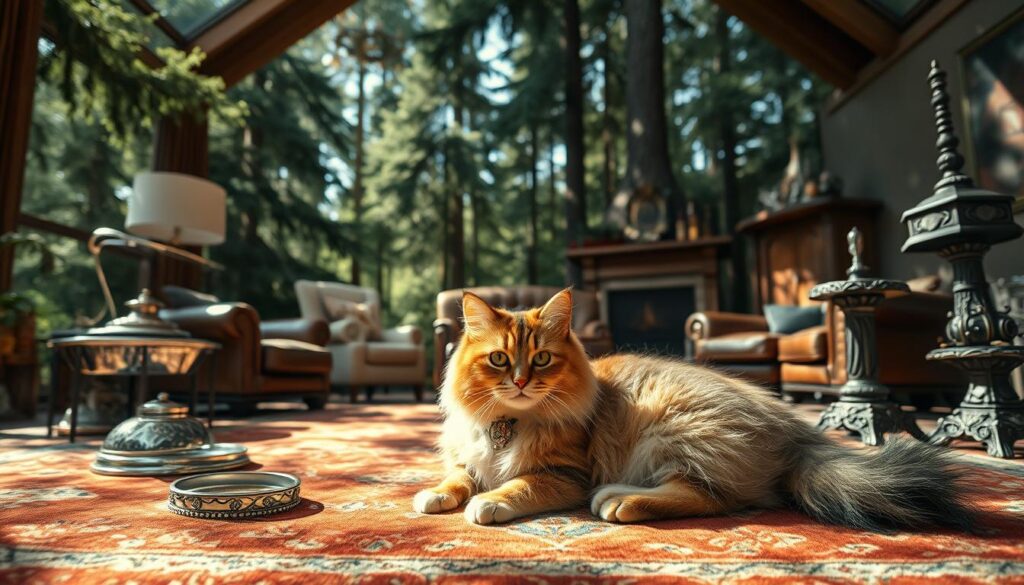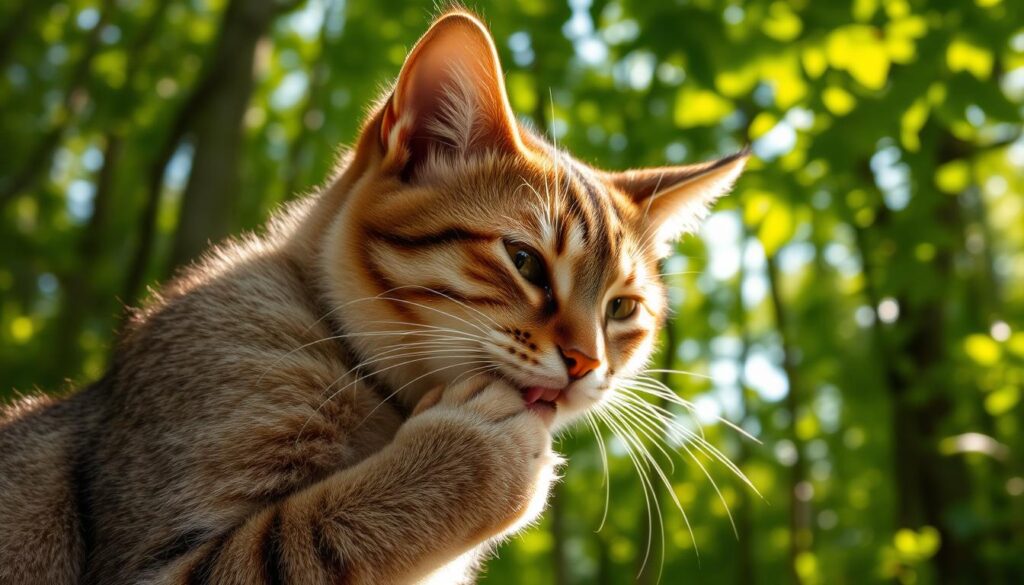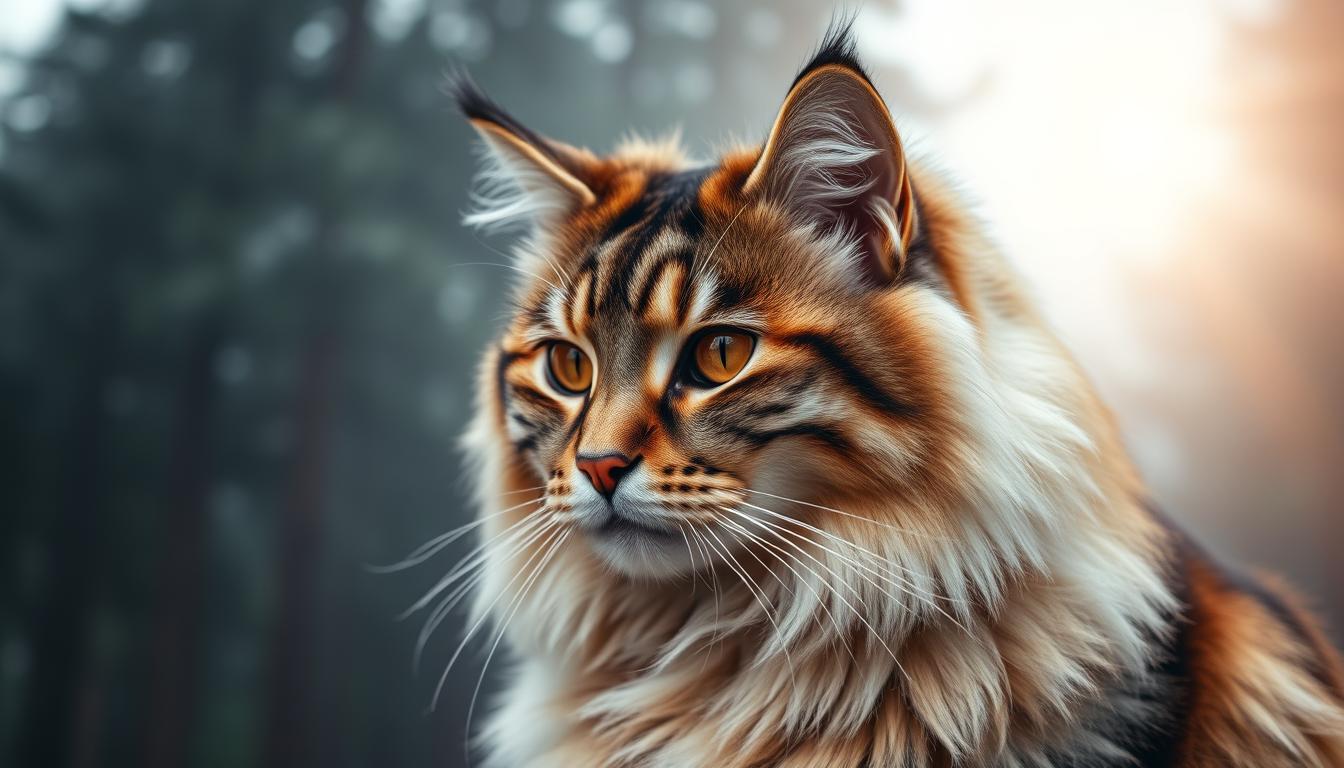Ever wondered what secrets forest cat breeders keep? Get ready for amazing stories and hidden truths about these Russian felines. As a cat lover, I’ve found secrets that change how we see forest cat breeding.
The Siberian forest cat breed is a treasure from Russia, with a history spanning centuries. These cats are more than pets; they’re pieces of history. Breeders have worked hard to keep this breed alive, making it a favorite among many.
Thinking of getting a Siberian forest cat? Hold on tight. Learning about forest cat breeders is about to get exciting. These cats cost between $1,000 and $2,000 and have a rich genetic history.
Prepare to explore a world where passion, genetics, and excellence meet. These seven shocking facts will make you rethink everything about forest cat breeders and their amazing breed.
Table of Contents
Understanding the Legacy of Forest Cat Breeding
The journey of forest cats spans centuries. They have adapted to harsh Nordic landscapes. Now, they are beloved pets, carrying a legacy from Viking history.
Forest cat breed information tells a story of resilience. These cats were vital on Viking ships. They did more than just keep company.
- Pest control during long maritime voyages
- Protection against rodent populations
- Spiritual guardianship in Viking households
Historical Roots in Nordic Culture
Forest cat breed characteristics came from a tough environment. Vikings saw them as divine protectors. Their bodies, fur, and climbing skills fit the Nordic climate perfectly.
Evolution from Wild to Domestic Companions
These cats didn’t become pets overnight. They slowly became part of human families. They kept their hunting skills and strong bodies, becoming loved family members.
Breed Recognition Milestones
Forest cats were recognized late. Important moments include:
- Formal breed recognition in Scandinavia in 1934
- Standardization efforts beginning in the 1970s
- Admission to the Cat Fanciers’ Association registry in 1994
From Viking ships to modern homes, their journey shows their adaptability and lasting charm.
What Makes Forest Cats Unique Among Pedigree Breeds
Forest cats are truly special as pets. They have unique traits that make them stand out. Their triple-layered coat is a key feature, helping them survive in cold climates like Siberia.
Forest cats have some amazing qualities:
- Exceptional cold-weather resilience due to their dense, multi-layered fur
- Impressive size range between 3.5 kg to 7.5 kg
- Extraordinary muscular build with strong survival instincts
- Naturally hypoallergenic qualities with lower Fel d 1 protein levels
Forest cats are also very smart and adaptable. They are great with families, especially children. They are playful and fun to be around.
Here’s what makes their temperament special:
- High intelligence (rated 4 out of 5)
- Excellent compatibility with other pets
- Low vocalization tendencies
- Strong social bonding capabilities
Forest cats can live up to 18 years. They are a long-term friend. Their strength and gentle nature make them a great choice for cat lovers.
Essential Guide to Forest Cat Breeders
Finding the right forest cat breeder can be tough. You need to do your homework and make smart choices. Knowing how to pick a reliable breeder is key to getting a happy, healthy cat.
When looking for a reputable forest cat breeder, keep these points in mind:
- Professional breeding certifications
- Transparent health testing records
- Clean and spacious breeding environments
- Willingness to answer detailed questions
- Genetic screening documentation
Identifying Genuine Breeders
A good breeder cares deeply about the health and happiness of their cats. They should show you medical records, genetic tests, and let you see their facility. They put the cats’ needs first, not just making money.
Red Flags to Watch
Watch out for these warning signs:
- Refuses to share health documents
- Limits your visit to their facility
- Can’t give you detailed breed info
- Always has kittens ready to go
- Asks too little money for a kitten
Critical Questions Before Purchasing
Make a list of important questions before buying a forest cat. Ask about vaccinations, genetic tests, socialization, and the parents’ health. A good breeder will answer all your questions clearly and openly.
The True Cost of Forest Cat Ownership

Thinking about getting a forest cat kitten? It’s important to know the total cost. The first price you see is just the start of what you’ll spend on this amazing cat.
Before you buy, plan your budget for both now and later. Here’s what you might need to pay:
- Initial purchase price: $600 to $1,500
- Premium breeding line kittens: Up to $4,000
- Monthly maintenance costs: Approximately $110
- Annual veterinary expenses: $200 to $400
- Initial setup costs: $300 to $500
Your forest cat needs ongoing care. Routine veterinary check-ups are key to keeping them healthy. You’ll need to budget for vaccinations, which cost $30 to $40 each.
Medical bills can add up. Some health problems might cost up to $5,000. Pet health insurance can save you a lot, covering up to 90% of vet bills.
Keeping a forest cat for life costs between $18,000 and $20,000. This includes food, vet bills, grooming, and more. They live for 12-20 years, so it’s a big investment.
Good financial planning helps you give your forest cat the best life. It’s worth it for those who love this special and stunning breed.
Health Considerations and Genetic Testing
Knowing about the health of forest cats is key for those interested in owning one. These cats are known for their strong genetic makeup. But, genetic testing is crucial for their long-term health.
Common Health Challenges
Forest cats are generally very healthy. Good breeders use genetic screening to avoid inherited diseases. Some common health issues include:
- Polycystic Kidney Disease (PKD)
- Hypertrophic Cardiomyopathy (HCM)
- Progressive Retinal Atrophy (PRA)
- Blood type incompatibility
Preventative Care Strategies
Good health care starts with regular vet visits and genetic tests. Early detection can greatly improve treatment results. Here are some steps to keep your cat healthy:
- Annual comprehensive health screenings
- Genetic disorder testing
- Regular cardiovascular examinations
- Nutritional monitoring
Genetic Screening Significance
Genetic testing is essential in responsible breeding. With over 197 known genetic variants in domestic cats, it’s vital to understand health risks. Reputable breeders focus on genetic screening to keep the breed healthy.
Physical Characteristics and Breed Standards
Exploring forest cat breed characteristics reveals a truly remarkable feline. The Norwegian Forest Cat has distinctive physical traits. They stand out with their impressive build and unique features.
These majestic cats have a robust and muscular body. It reflects their wild ancestry. Their physical characteristics include:
- Substantial body weight ranging from 11-18 lbs
- Height spanning 15-18 inches at the shoulder
- Thick, water-resistant double coat for extreme weather protection
- Large, rounded paws with impressive toe tufts
Forest cat breed information shows these cats take time to mature. They reach full physical development between 3-4 years. This is longer than many other cat breeds.
Their slow maturation contributes to their robust physique. Their coat is another remarkable feature. It’s dense and woolly, perfect for cold Nordic environments.
- Eye colors range from gold to green
- Triangular head shape with straight profile
- Strong, muscular neck and broad chest
Understanding these physical characteristics helps us appreciate the Norwegian Forest Cat’s breed standards. It shows their remarkable evolutionary adaptations.
Forest Cat Temperament and Personality Traits
Forest cats are known for their interesting temperament and unique traits. They are smart and can easily adjust to different homes. This mix of wild and domestic charm makes them special.
Social Behavior Patterns
Forest cats are very social and smart. They can fit well into many home settings. Their social skills include:
- High adaptability in multi-pet households
- Ability to interact well with both cats and dogs
- Patient and gentle interactions with family members
Family Compatibility
Forest cats are great with families. They are gentle and friendly, making them perfect for homes with kids. Their sociable nature and affectionate ways are key strengths.
- Gentle nature with children
- High sociability quotient
- Affectionate behavior on their own terms
Training Potential
Forest cats are surprisingly easy to train. They are smart and can learn tricks like sit, stay, and even walk on a leash. They also love solving puzzles, keeping them engaged and fun to be around.
Forest cats offer a unique pet experience. They are intelligent, adaptable, and loving. They make great companions for those looking for a special feline friend.
Grooming Requirements and Maintenance

Thinking about getting a forest cat? Knowing their grooming needs is key. Norwegian Forest cats have a thick, water-resistant coat. They need regular grooming to stay in top shape.
Brushing is essential for their coat care. These cats need special grooming:
- Daily brushing in spring and fall
- Brush 2-3 times a week otherwise
- Use a de-shedding tool for loose undercoat
- Prevent knots and mats in their fur
Forest cat grooming goes beyond just brushing:
- Trim nails every 10-14 days
- Brush teeth 3 times a week
- Check ears for infections
- See a pro for mats
Your cat’s coat health shows their nutrition. A high-quality diet is key for a shiny coat. Regular grooming makes your cat look great and strengthens your bond.
Breeding Practices and Ethics in Forest Cat Communities
Looking for forest cat breeders? It’s key to know about ethical breeding. Good breeders care more about their cats’ health than making money. The Cat Fanciers’ Association (CFA) and The International Cat Association (TICA) have strict rules for breeding.
Start by doing your homework. Good breeders will show you health records and vet papers. They also make sure kittens are vaccinated and healthy. Facebook can help you see how breeders treat their cats.
Professional breeders test their cats’ genes and aim for long-term health. Cats live 10-15 years, so breeders want kittens to be healthy and friendly. Be wary of breeders who push hard, don’t show health records, or are secretive about the cat’s background.
Look for breeders with certifications from known groups. This means they follow strict rules and care about their cats. Choosing a certified breeder is good for your cat and the breed’s future.
FAQ
What is a Forest Cat?
Forest cats are big and strong, coming from cold places. The Siberian Forest Cat is the most famous. They have a thick coat, are big, and can handle harsh weather. They’re smart and have special looks that came from living in places like Russia.
How Much Do Forest Cat Kittens Cost?
Forest cat kittens cost between
FAQ
What is a Forest Cat?
Forest cats are big and strong, coming from cold places. The Siberian Forest Cat is the most famous. They have a thick coat, are big, and can handle harsh weather. They’re smart and have special looks that came from living in places like Russia.
How Much Do Forest Cat Kittens Cost?
Forest cat kittens cost between $1,500 and $4,000. The price depends on their family tree, the breeder’s reputation, and their looks. You’ll also need to pay for food, vet visits, and care.
Are Forest Cats Hypoallergenic?
Forest cats, especially Siberians, might be easier for people with allergies. They make less of the protein that causes most allergies. But, everyone reacts differently, so it’s best to try them out first.
What Health Tests Should Reputable Forest Cat Breeders Perform?
Good breeders test for heart problems, eye issues, and other diseases. They should show proof of:
– Heart scans
– Genetic tests
– Vaccines
– Protection against parasites
How Do I Find a Reputable Forest Cat Breeder?
Look for a good breeder by:
– Checking with groups like The International Cat Association (TICA)
– Asking for health and genetic tests
– Visiting the breeder in person
– Getting references
– Making sure they breed ethically
What Grooming Requirements Do Forest Cats Have?
Forest cats need regular grooming because of their thick coat. They should be brushed 2-3 times a week, more during shedding seasons. Use a metal comb and get professional help sometimes.
Are Forest Cats Good with Children and Other Pets?
Forest cats are usually gentle and easy-going. They get along well with kids and other pets. They’re smart and social, but need to be socialized early.
What Is the Average Lifespan of a Forest Cat?
Forest cats, like Siberians, live 12-16 years with the right care. Their lifespan depends on their genes, diet, and health.
,500 and ,000. The price depends on their family tree, the breeder’s reputation, and their looks. You’ll also need to pay for food, vet visits, and care.
Are Forest Cats Hypoallergenic?
Forest cats, especially Siberians, might be easier for people with allergies. They make less of the protein that causes most allergies. But, everyone reacts differently, so it’s best to try them out first.
What Health Tests Should Reputable Forest Cat Breeders Perform?
Good breeders test for heart problems, eye issues, and other diseases. They should show proof of:
– Heart scans
– Genetic tests
– Vaccines
– Protection against parasites
How Do I Find a Reputable Forest Cat Breeder?
Look for a good breeder by:
– Checking with groups like The International Cat Association (TICA)
– Asking for health and genetic tests
– Visiting the breeder in person
– Getting references
– Making sure they breed ethically
What Grooming Requirements Do Forest Cats Have?
Forest cats need regular grooming because of their thick coat. They should be brushed 2-3 times a week, more during shedding seasons. Use a metal comb and get professional help sometimes.
Are Forest Cats Good with Children and Other Pets?
Forest cats are usually gentle and easy-going. They get along well with kids and other pets. They’re smart and social, but need to be socialized early.
What Is the Average Lifespan of a Forest Cat?
Forest cats, like Siberians, live 12-16 years with the right care. Their lifespan depends on their genes, diet, and health.
Source Links
- Siberian – Cats.com – https://cats.com/cat-breeds/siberian-cat
- What To Know About a Siberian Cat – https://www.webmd.com/pets/cats/what-to-know-siberian-cat
- 20 Black Cat Breeds That’ll Bring You Good Luck – https://www.petmd.com/cat/general-health/black-cat-breeds
- Norwegian Forest Cat – https://www.petduka.com/en/knowledge-base/cat-breeds/norwegian-forest-cat/
- Viking Cats: Uncover Their Fierce Feline History – https://nlsnorwegian.no/viking-cats-uncover-their-fierce-feline-history/
- Discover the Magic of Norwegian Forest Cats Today! – https://purebredkitties.com/blogs/norwegian-forest-cat/understanding-the-enchanting-norwegian-forest-cat-breed?srsltid=AfmBOoovv9HaHyAbzzJebX02b37EysvxNQ4fl6tVPhG0zjxe1lJxsGEm
- Siberian Forest Cat | History, Traits, and Care – https://felinefancy.co.uk/blogs/cat-breeds-info/siberian-forest-cat?srsltid=AfmBOopCAdMKzLTSDB5iTlzbNo61mYlh–HBH7OVh5tsXN-ww3t92dgy
- Norwegian Forest Cat Adoption – Petzooie – https://www.petzooie.com/articles/the-comprehensive-guide-to-norwegian-forest-cat-adoption
- Norwegian Forest Cat | Traits, Appearance, General Character – https://www.vetamerikan.org/our-best-friends/cat-types/norwegian-forest-cat
- How much is a Norwegian forest cat – Petzooie – https://www.petzooie.com/articles/how-much-is-a-norwegian-forest-cat-a-comprehensive-guide
- How Much Does a Norwegian Forest Cat Cost? | Spot Pet Insurance – https://spotpet.com/blog/breed-tips/how-much-does-a-norwegian-forest-cat-cost
- Norwegian Forest Cat – https://www.dailypaws.com/cats-kittens/cat-breeds/norwegian-forest-cat
- Genetic Testing: practical dos and don’ts for cats – https://pmc.ncbi.nlm.nih.gov/articles/PMC11626677/
- Understanding common genetic conditions in cats – https://www.wisdompanel.com/en-gb/blog/common-genetic-conditions-in-cats
- Norwegian Forest – TICA – The International Cat Association – https://tica.org/breed/norwegian-forest/
- Norwegian Forest Cat | zooplus Magazine – https://www.zooplus.co.uk/magazine/cat/cat-breeds/norwegian-forest-cat
- Norwegian Forest Cat: Info, Pictures, Facts, & Traits – Catster – https://www.catster.com/cat-breeds/norwegian-forest-cat/
- Norwegian Forest Cat | Explore the World of Norwegian Cats, Kittens, & Their Unique Traits – https://www.embracepetinsurance.com/cat-breeds/norwegian-forest-cat
- What to Know About a Norwegian Forest Cat – https://www.webmd.com/pets/cats/what-to-know-about-norwegian-forest-cats
- How to Groom a Norwegian Forest Cat: 9 Easy Tips | PangoVet – https://pangovet.com/pet-lifestyle/cats/how-to-groom-a-norwegian-forest-cat/
- How to Find a Responsible Cat Breeder in 2025: 5 Helpful Tips | PangoVet – https://pangovet.com/pet-lifestyle/cats/how-to-find-a-responsible-cat-breeder/
- Toxocara cati Infection in Cats (Felis catus): A Systematic Review and Meta-Analysis – https://www.mdpi.com/2076-2615/14/7/1022




